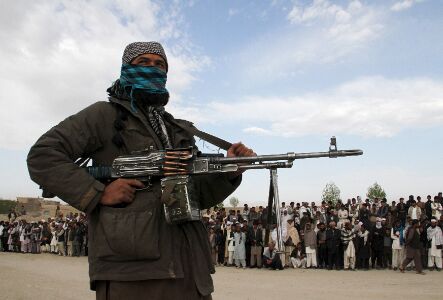A rock and a hard place

When the US announced that it would be winding down its 'forever war' in Afghanistan by September 11, there was a visible shock that ran through the international community. US involvement in West Asia (Middle East) has made the region a significant geopolitical flashpoint with many different nations involved in the US war on terror. Now that the US has finally indicated that it wishes to be done with its Afghan campaign, many questions remain about the future of the region. The US pullout jeopardises the Afghan peace process wherein the Taliban attempts to reach a middle ground with the Afghan government. Already, there are indications that the Taliban sees no real point in continuing with the negotiations. The recent Afghan peace conference in Istanbul was cancelled because the Taliban delegation was a no-show. The group has unequivocally stated that if the US is not gone from Afghanistan by May 1, which was the previous deadline for the withdrawal, then the Taliban will likely continue its fight to drive out what they see as foreign invaders. This, as many commentators have observed, gives the group the ideal excuse to no longer engage in the peace process. Either way, as Biden has asserted, America intends to leave the region on September 11, with or without a peace deal. In such a case, the Taliban has no need to negotiate with a weak and corrupt Afghanistan Government propped up by the force of US arms. In its more recent statements, the Taliban has made it clear that it intends to, in some form or fashion, return the nation to the days when the group ruled it as the Islamic Emirate of Afghanistan. The US and its western allies aside, the re-emergence of Taliban rule provides a complicated challenge to other regional powers as well. One of those powers is India. For two decades, India has steadily invested its resources and expertise in helping to develop Afghanistan. India has funded infrastructure programmes, opened up lines of credit and has even recently taken up an active role in training Afghan security and police personnel. India's deliberate and non-interfering approach to diplomacy in the country has won it the favour of both the Afghan government and its people. India's relationship with the Taliban, on the other hand, is somewhat more complicated as the group has previously supported or been associated with many anti-India groups such as the Lashkar-e-Taiba. In addition, the Taliban is also known to have close relations with Pakistani ISI. Some of the factions within the Taliban are also thought to be anti-India. The resurgence of the Taliban as a ruling power in Afghanistan is thus a matter of great concern for India as it would open up another front for anti-India activities to be carried out. This is aside from the fact that many of the Taliban's views on governance, education, women, etc., are ideologically antithetical to India. But this does not mean that India can or should view the Taliban solely as an enemy. In recent years, as the reality of US withdrawal from Afghanistan came closer to fruition, India tentatively started reaching out to the Taliban. First to sound out its intentions, particularly in regards to India. Then, if the need for it arises, to build a working relationship that isn't friendly but is not antagonistic either. The Taliban has notably stated that it welcomes India's aid in Afghanistan and that it has no animosity against the nation. Taliban has also been careful to not attack any India-funded projects in the region. More significantly, the group also publicly dismissed the idea of joining the Jihad in Kashmir and has claimed to have no interest in the Kashmir issue. These 'friendly' statements must be taken with a pinch of salt because the Taliban is not quite as monolithic a group as some might expect. While the Taliban may not overtly act against India itself and may even make friendly gestures, this is no guarantee that the group will not support those groups with less polite intentions towards India. Where does this leave India in regards to Afghanistan? In short, in an inconvenient position. India has spent considerable effort in the last two decades to woo the population and the government to withdraw at this point. Increasing engagement with the Taliban will be suitable to India's strategic interests even if it is a bitter pill to swallow. Still, for now, there are indications that India is currently looking to expand its relations with the Afghan government even further in the meanwhile. In particular, defence cooperation is expected to expand between the two nations as India continues to provide training and military hardware to Afghan security forces. Chief of Defence Staff General Bipin Rawat recently stated that the US withdrawal from the region must not create "space for disruptors to step in". It would seem that for now, India will continue this tough balancing act until it is no longer viable.



